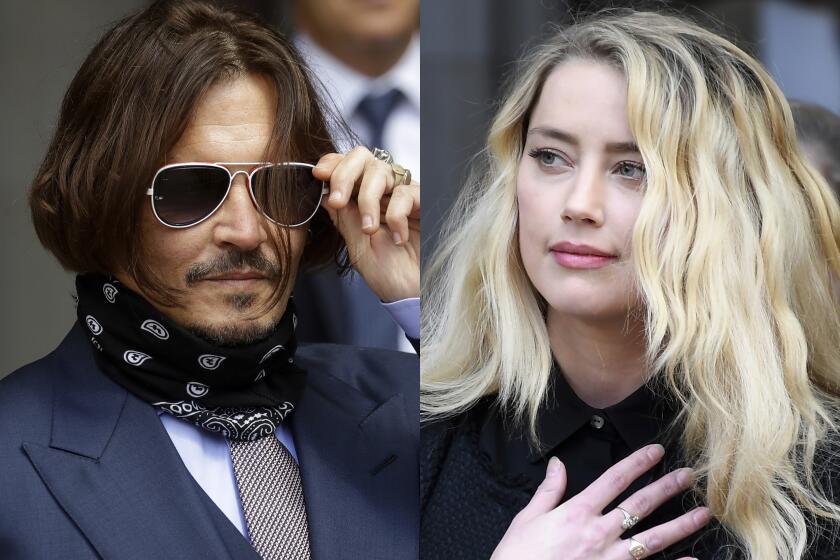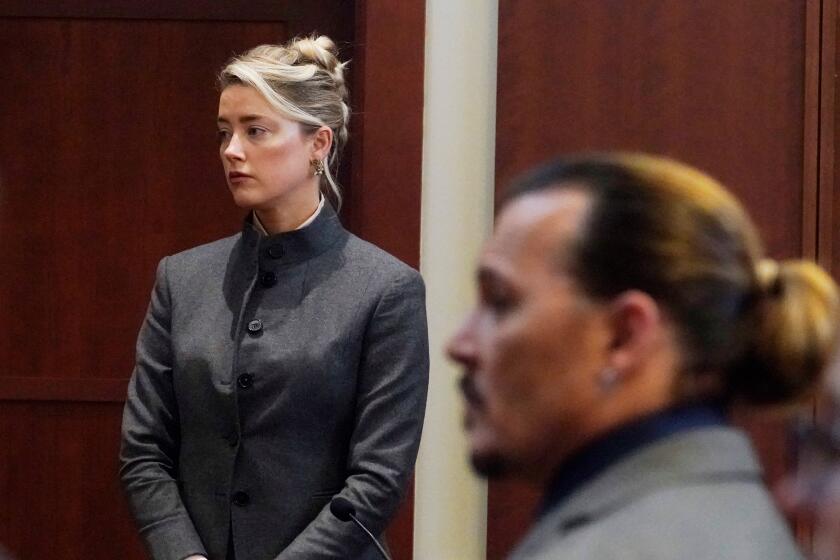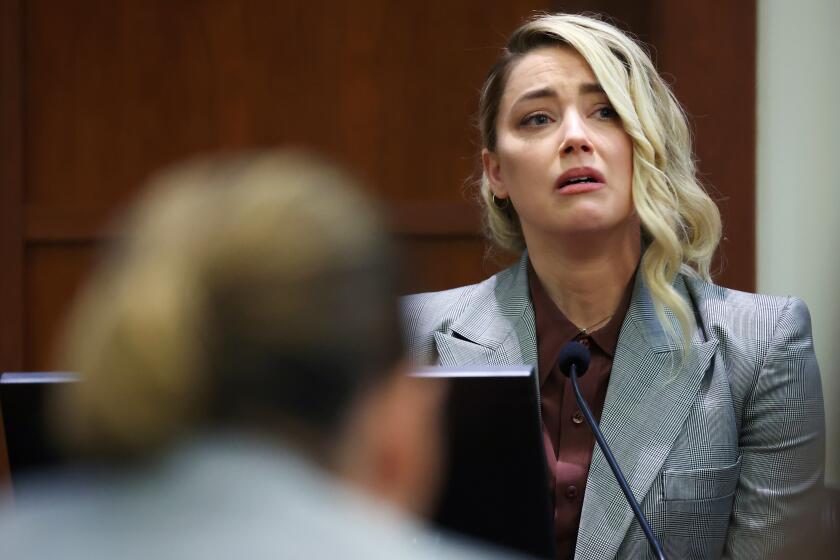We can’t agree on the meaning of Depp vs. Heard. Here’s how we move forward anyway
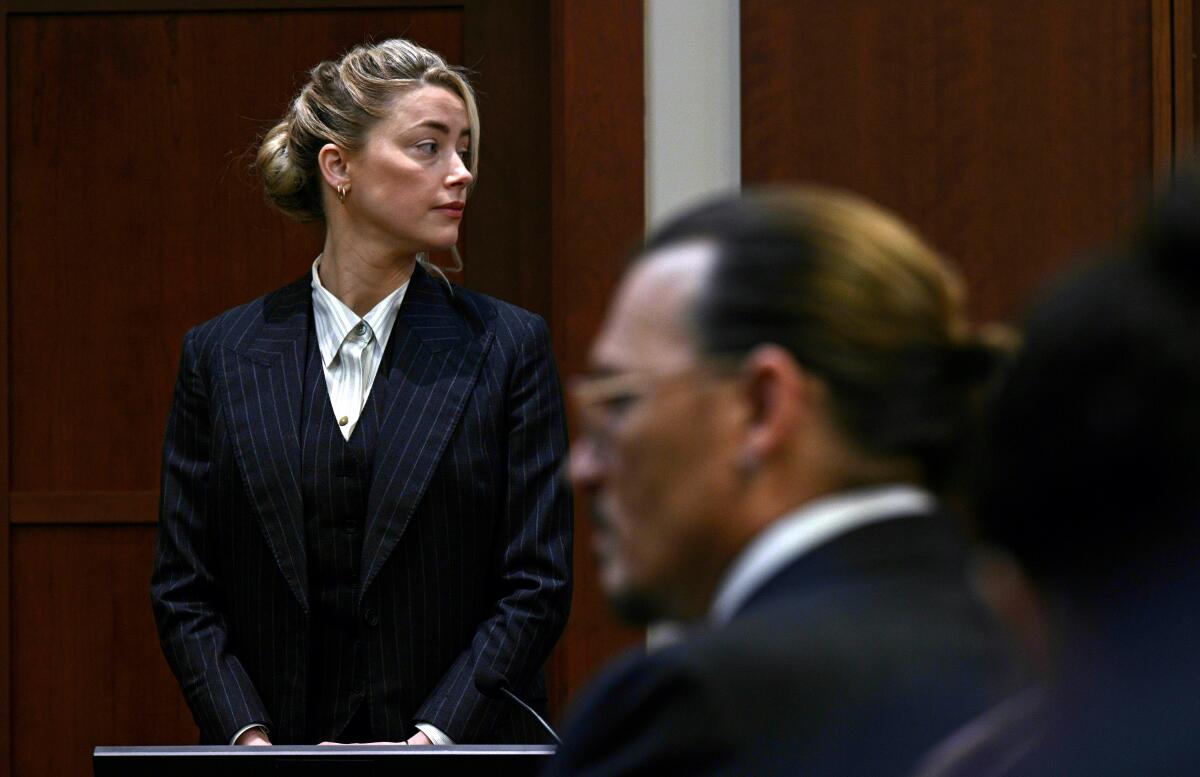
- Share via
On June 1, after more than six weeks of testimony and deliberations, a Virginia jury decided that Amber Heard defamed ex-husband Johnny Depp when she identified herself as a “public figure representing domestic abuse” in a 2018 Washington Post essay that ran under the headline “Amber Heard: I spoke up against sexual violence — and faced our culture’s wrath. That has to change.”
The jury also found that Heard had been defamed by one of Depp’s lawyers when he called her accusations of domestic violence a hoax. But by awarding Depp $15 million and Heard $2 million, the decision clearly supported Depp’s yearslong contention that he had never perpetrated domestic or sexual violence against Heard and that she had been lying when she said he did.
Since it began, the livestreamed trial was zealously parsed by supporters of each actor; the decision launched an equally disparate welter of reactions — it was “justice for Johnny” or “the end of #MeToo.” Times reporter Meredith Blake and columnist Mary McNamara discuss what the trial may or may not mean for women, for men and for the culture they share.
Johnny Depp’s defamation trial against Amber Heard turned the former couple’s dirty laundry into trending topics. Here’s a timeline of key moments.
Mary McNamara: While I understand that many people are surprised and some believe the verdict is deeply unfair, it would be great if we could agree, as a nation, to not lose our minds over this case any more than we already have.
Or maybe just not keep putting so much effort into turning the jury’s decision into something it is not.
Despite what some have expressed on social and other media, the decision is not proof that God does or does not exist, that justice is or is not attainable in this country or that Johnny Depp is a victim of abuse or even a nice guy. More important, it is not a referendum on the #MeToo movement or the veracity of millions of domestic abuse survivors, female and male.
Unless we continue to do everything we can to make it those things.
The judge’s questionable decision to livestream the trial guaranteed it would become a public spectacle, and public spectacles are never pretty. The amount of personal abuse aimed at Heard on social media is straight-up horrifying and in many cases deeply sexist.
But for me, the livestream of “Is this the end of #MeToo?” essays has been just as disturbing.
Obviously, legal decisions set legal precedents, and precedents can create a “chilling effect.” But so can a collective willingness to give Depp vs. Heard the power to undo decades of legal and cultural progress.
Why are we so eager to see in this very specific and frankly outlier case a template for all trials involving accusations of abuse?
It makes sense that those who feel #MeToo is nothing more than a witch hunt would try to make the decision into some sort of grand statement about all accusations against alleged abusers, but why are those who have worked so hard to make it safe for women (and men) to come forward so ready to play into their hands?
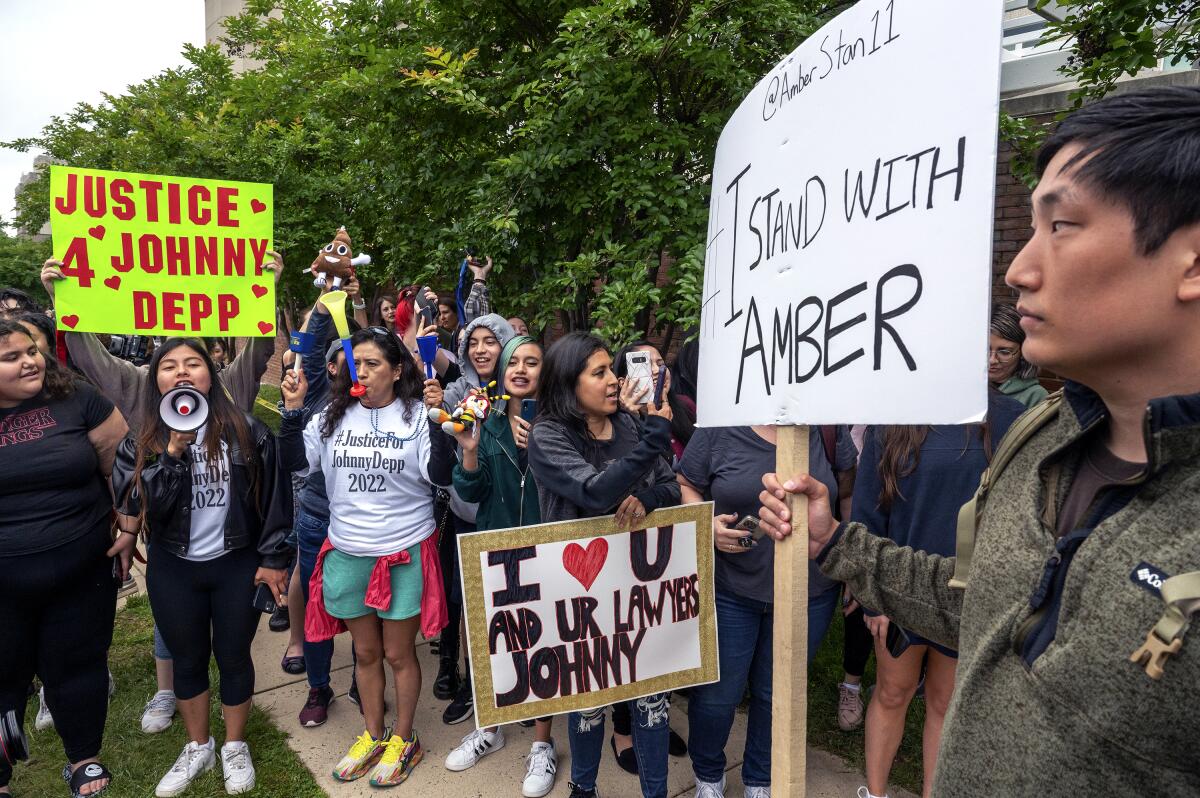
Having not been in the courtroom or on the jury, I’m not going to offer an opinion on whether Heard lied or exaggerated her abuse, or if she intentionally defamed Depp by writing an essay that implied a direct contradiction to the statement she and her ex-husband made when they reached their divorce settlement.
But to place the future of all domestic and sexual abuse and harassment cases on the shoulders of one couple, to put a jury in the position of deciding not just one case but the fate of all cases involving a woman accusing a man of abuse, is not just absurd. It’s self-destructive and sexist.
What do you think, Meredith?
If Johnny Depp sued Amber Heard for defamation just to prove that there are people who still think he’s a big movie star, he’s won. But at what price?
Meredith Blake: I think Heard should consider the bright side: Maybe in 20 years, Ryan Murphy will make a sympathetic limited series about her plight.
The apocalyptic cries about this trial representing the end of #MeToo are certainly overblown — and underestimate the hard work of activists and advocates whose cases will never make it to Court TV. But I do worry that, collectively, we have learned very little about the way we treat women who dare to be imperfect while holding powerful men accountable, and that we may be doomed to repeating this media cycle forever.
For years, Hollywood has dutifully reconsidered the women it once gleefully tore to shreds. Britney Spears, Monica Lewinsky, Paula Jones, Pamela Anderson, Lorena Bobbitt, Paris Hilton, Marcia Clark: All were mocked, maligned and publicly shamed by the cultural arbiters on cable news and late-night TV. All have been reexamined via probing documentaries, prestige drama series and Oscar-baiting biopics.
This programming trend has had certain real-world ramifications: In November, a judge put an end to Spears’ conservatorship after 13 years.
But then, fresh off of our Britney outrage, we watched in real time as Heard was put on trial for her personality, meme-ified by a mob of Depp fanboys who mocked her hair, her clothes, the way she cried. Over six weeks, the trial turned into a vulgar popularity contest tallied via coffee shop tip jars and celebrity Instagram likes. And even if she had prevailed in court, Heard was never going to win.
Sure, Depp might be an aging egomaniac with profound substance abuse problems, the sort of spouse who gleefully texts his actor buddies about how he wants to drown and burn his wife and then have sex with the corpse.
But, you know, she was just so … unlikable.
I am not a legal expert, nor do I play one on TV, and I can’t begin to understand how the already carefully lawyered words in Heard’s op-ed (“a public figure representing domestic abuse” could mean many things!) amount to defamation. And in the end, that’s not what this trial seemed to be about anyway. As Depp himself wrote, in another text to an industry pal, it was about Heard’s “global humiliation.”
Depp was not present in court Wednesday — presumably he was too busy sorting his scarf collection — but the actor and his many supporters, including the Republican members of the House Judiciary Committee, did a chest-thumping victory lap on social media.
What I can’t quite comprehend is just why this particular person — a once-edgy performer who made so much money doing Keith Richards cosplay in the “Pirates of the Caribbean” movies that he was able to buy a private island in the Bahamas — has become a folk hero to so many. Could it be that fans see Heard as a convenient scapegoat for Depp’s descent into self-parody?
Mary, just what is it about Depp that provokes such irrational loyalty?
After a bruising six-week trial, both Johnny Depp and Amber Heard face uncertain career prospects.
MM: I have no answer to this. I liked “Edward Scissorhands” and the first “Pirates” film as much as the next person, but I don’t understand stan culture in general, and I am not sure what Depp represents to these fans. But then the whole pirate mythology is baffling to me, “Our Flag Means Death” notwithstanding. Pirates were thieves and rapists and murderers, after all.
By his own admission, Depp was a participant in what can only be described as an abusive marriage. That abuse may have been mutual, and the members of the jury did not think his behavior constituted domestic violence, but neither he nor Heard came off as particularly nice people.
But as you say, it was Heard who was continually described as “unlikable,” which is one of the reasons the case has resonated through so much of the culture. “Unlikable” is a completely subjective description, revealing as much about the describer as the described, and it is leveled almost exclusively at women. Men usually get something a bit more specific, words that have more to do with their actual characteristics than the speaker’s (or tweeter’s) reaction to them.
I think there is a lot to be discussed in the hysterical reaction to Heard, but while it is definitely part of the conversation about the case, it is not a reason to make sweeping statements about what the verdict means to the prosecution of future cases. Heard was in fact believed when she first made the accusations, and supported by many, even as Depp denied the allegations and others questioned the consistency of her accusations.
Her own subsequent statement after she and Depp reached a settlement, about there having been no abuse, seemed to put the issue to rest. So it seemed surprising when she wrote the essay (or allowed it to be written under her name), though it did not receive anything like the attention it did after Depp decided to sue for defamation.
The headline — which made Heard out to be a victim of sexual violence, something she had never publicly alleged — was much more incendiary than the piece. But in the end, it was the judge’s decision to allow the trial to be livestreamed that turned this into a media circus. If this trial had simply been reported, the verdict may have still shocked many, but we would have seen less of the sexist vitriol aimed at Heard.
In a culture weaned on reality TV, it was treated too often as entertainment, as if Depp and Heard were characters, not actual people. Which may account for the litany of pieces arguing, with increasing hyperbole, about why the trial is important. We have to justify our desire to hang on every terrible word.
After Amber Heard tearfully described how she’s suffered, she rejected testimony from a key Johnny Depp witness: ‘How would he know? He wasn’t there.’
MB: The role of social media notwithstanding, there were so many ways that this interminable trial — there are war crime tribunals that have taken less time — felt like the oddest kind of throwback. And not just because of the way Heard was pilloried and mocked in a fashion that would make Jay Leno cringe.
It was also a TV event, the likes of which we rarely see anymore. Depp vs. Heard, like the People vs. O.J. Simpson nearly 30 years ago, was a boon for TV networks, exponentially boosting ratings for Court TV — a recently relaunched network that hasn’t been so central to the cultural conversation since the Clinton administration. A livestream of the verdict has been viewed nearly 24 million times as of Thursday afternoon — a bigger draw than this year’s Oscars.
It is remarkable how this trial was able to captivate the nation at a time when, quite frankly, we have plenty of other things to be worried about. Things like baby formula shortages and inflation and teenagers using easily acquired weapons of war to wantonly kill schoolchildren and grocery shoppers.
I am not one of those people who automatically thinks celebrity scandals — especially sordid, complex sagas that get turned into “pick a team” narratives — are a woeful distraction from the “real” news. If anything, they can serve as a mirror of our most deeply rooted prejudices. And in this case, the blind support for Depp and vitriol directed at Heard reflected a distrust of women that is, sadly, timeless.
More to Read
The biggest entertainment stories
Get our big stories about Hollywood, film, television, music, arts, culture and more right in your inbox as soon as they publish.
You may occasionally receive promotional content from the Los Angeles Times.
